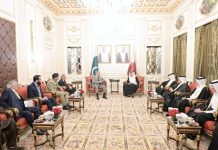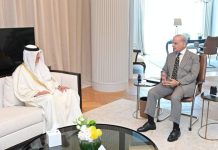By Ajmal Khan Yousafzai
Islamabad: A session of the National Assembly called to vote on the expulsion of the French ambassador from Pakistan, one of the key demands made by the proscribed Tehreek-e-Labbaik Pakistan (TLP), was held in Islamabad on Tuesday. The government had called the session to debate the French envoy’s expulsion, and a PTI lawmaker presented a resolution in this regard. However, before a vote could take place on the resolution, the speaker announced the formation of a special committee to discuss the matter and asked the government and the opposition to engage with each other to develop consensus on the issue. At the start of the session, PTI lawmaker Amjid Ali Khan moved a resolution condemning the publication of blasphemous caricatures by French magazine Charlie Hebdo in September last year. It also regretted the French’s president “encouragement of the elements hurting the sentiments of the hundreds of millions of Muslims in the name of freedom of expression”. The resolution asked for a debate to be held on the issue of expelling the French ambassador from Pakistan, and to “apprise all European countries, especially France, of the gravity of this matter”. It further said detailed discussions on the matter should be held with all Muslim countries and it should be taken up jointly on international forums.
“This house also demands that the state should decide matters of international relations and no person, group or party can exert unnecessary illegal pressure in this regard,” Amjid said while reading out the resolution, which also called upon the provincial governments to allocate specific sites for protests in all districts so that citizens’ daily life was not disrupted. The PTI lawmaker also sought the formation of a special committee to consider the resolution regarding the matter which he termed “highly sensitive”. This motion was adopted.
Speaking during the session, PML-N MNA Shahid Khaqan Abbasi said the entire country was “unanimous” on the issue of the protection of Namoos-i-Risalat, and accused the speaker of making it controversial within the house.
“This resolution should have been unanimous. You adjourned the House yesterday and called it today. You and the government did not bother to talk to the opposition regarding the purpose of calling the [session],” Abbasi said, addressing Speaker Asad Qaiser. “You wanted to bring a resolution, the [right] way is to talk to the opposition.”
He reiterated that there was no difference of opinion on Tahaffuz-i-Namoos-i-Risalat and Khatm-i-Nabuwwat. “This resolution is inadequate,” the PML-N leader said, requesting that the opposition be given an hour to study the draft and suggest any additions so that the resolution could be passed unanimously today and a debate could be started. He said there was no need for a special committee. “You have paralysed this House for three years and turned it into an arena of abuse and cursing,” he alleged, requesting that the opposition be allowed to present a comprehensive version of the resolution.
Responding to him, Minister of State for Parliamentary Affairs Ali Muhammad Khan said the government desired a debate on the issue. He said the resolution based on the exact discussions held between the government and the TLP was moved by a private member and therefore the government did not plan to make changes to it, however, “whatever the entire House considers appropriate will be done.”
Earlier today, Interior Minister Sheikh Rashid Ahmed announced that the government will present a resolution on the expulsion of the French ambassador in parliament. On Monday, the NA session was adjourned to meet again on April 22 (Thursday) at 2pm. However, shortly after the minister’s statement, it was announced that the schedule had been changed and the session would take place on April 20 (today). The announcement came after a government delegation, comprising the interior minister and Religious Affairs Minister Pir Noorul Haq Qadri, met TLP workers for yet another round of talks in Lahore late on Monday. In his remarks today, Maulana Asad Mehmood of the JUI-F said Prime Minister Imran Khan had given the government’s policy statement in a national address on Monday evening, which he said the ministers could not do in the parliament yesterday.
“The prime minister did a good job of adding fuel to the fire,” Mehmood alleged, saying it was surprising for his party who held negotiations with the TLP after the government had announced its policy (of cracking down on the TLP).
“We had demanded that you bring the agreements here … there was a ban on media, the facts of what happened in Lahore three days ago were not shown. I demand that the media be given full freedom to show the blood-letting of TLP workers. The govt should be bound that Tahaffuz-i-Namoos-i-Risalat and Khatm-i-Nabuwwat is part of our belief,” he said.
The JUI-F MNA said the House was united on the part about Namoos-i-Risalat in the resolution, but the opposition found its second part to be inadequate in light of the current situation in the country. He also condemned the “atrocity and violence” carried out by the government against TLP activists.
“Regarding the development last night, the parliament should be made aware who actually negotiated with the TLP,” he said, referring to the headway in talks between the government and the TLP. “The government should announce who is responsible for our policemen and officers losing their lives or suffering injuries, and all the people who died on this issue.”
He criticised the government for allegedly not taking the opposition into confidence before calling the emergency session. “I believe the whole parliament should be made into a committee,” Mehmood said, adding that he was under the impression that the government would present a resolution calling for the French ambassador to be expelled but the wording of the resolution was “weak”.
“Why were you criminally silent for three months? Why didn’t you debate on this in three months?” he asked the treasury benches. He warned the government against “bulldozing” the resolution through the assembly, saying if it ignored the opposition, “I swear on oath, I will not let you run the parliament.”




